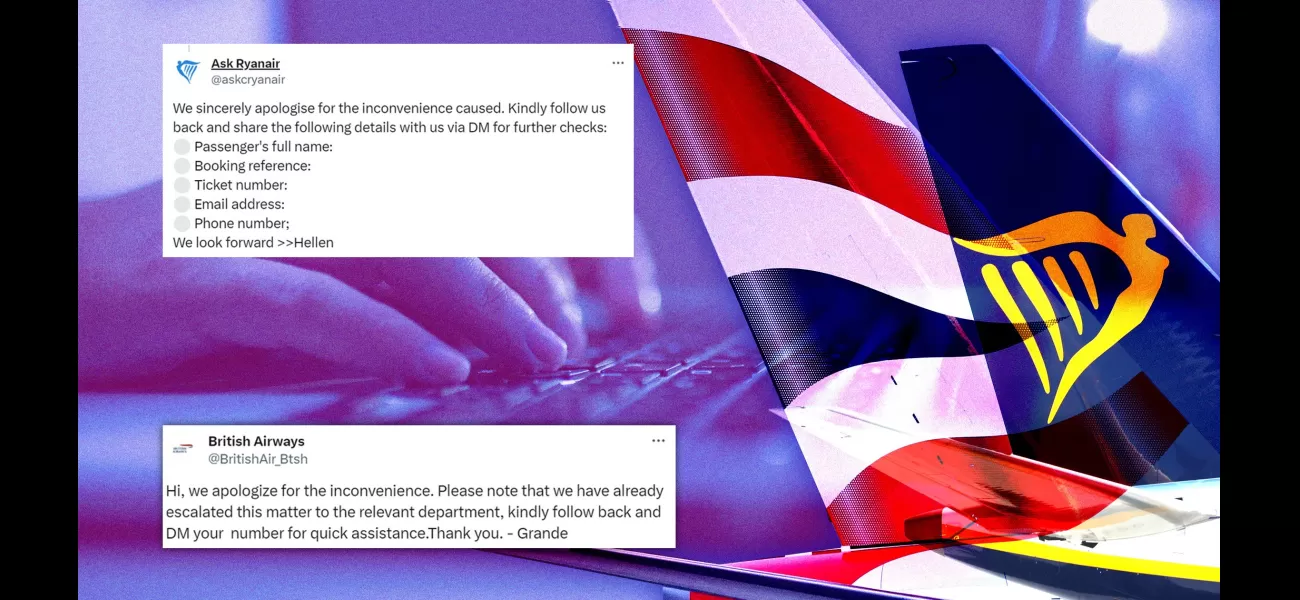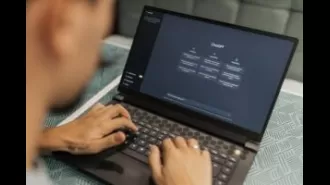Travelers cautioned about airlines scams on X holiday
Ways to identify them.
June 10th 2024.

Beware, holidaymakers! Scammers are on the prowl, targeting unsuspecting customers of major airlines on the popular social media platform X. As we gear up for the summer holiday season, the rise in these fraudulent activities raises concerns about whether X is doing enough to address the issue.
It's a common practice for frustrated travelers to voice their complaints or issues on X, tagging the airline in their posts. However, according to Which?, a consumer rights group, these messages are quickly picked up by scammers, who often use bots. They then reply with an account that has a similar name to the airline, hoping to trick customers into sharing sensitive information by impersonating the airline's customer service team.
To illustrate this, Which? conducted an experiment where they contacted Wizz Air on X to inquire about a delayed flight. Within minutes, they received responses from two fake accounts using almost identical language. Both apologized for the inconvenience and claimed to have escalated the matter to the relevant department. They then requested a reachable WhatsApp number for further assistance via direct message.
This is just one example that highlights the severity of the issue. Which? also found numerous fake accounts impersonating all major airlines operating in the UK, including British Airways, Virgin Atlantic, Tui, easyJet, and Ryanair. These fake accounts not only respond to complaints or queries at a faster rate than the legitimate ones but also interrupt conversations with the real airline customer service teams.
So, how can you avoid falling victim to these fake airline accounts? First and foremost, remember that airlines will never ask for your bank or card details over social media, even in a direct message. This should immediately raise red flags for customers. Additionally, be cautious of links that these scammers may send, as they could lead to phishing websites that can steal your card details. In some cases, scammers may also claim that you are entitled to compensation or owe a fee to resolve an issue. They might ask you to download a payment app, through which they can steal your money.
It's always best to contact the airline directly for any major queries and never share sensitive information over social media. Even if the scammer is not successful in stealing your money, they can still obtain enough personal data to commit identity fraud. So, be wary if they ask for your phone number or other personal information via direct message.
But how can you differentiate between fake and real accounts? Following Elon Musk's takeover of X, blue ticks are now available for purchase, meaning that an account having one does not necessarily make it legitimate. Which? found that some of the fake accounts they encountered also had blue ticks, which can be bought for around £10 a month worldwide. However, there are other signs to watch out for, such as the date an account joined X and the number of followers they have. Legitimate accounts of major airlines will have tens of thousands, if not more, followers, while most scam accounts have only a handful. Another red flag is unusual spellings or additional characters in the account name. For example, one fake account was named @wzzair_.
To help you identify which accounts are legitimate, here is a list of the genuine X accounts for seven major airlines:
- @British_Airways
- @easyJet
- @jet2tweets
- @askryanair
- @tuiuk
- @VirginAtlantic
- @wizzair
If you come across a suspicious account claiming to belong to any of these airlines, do not engage with them and report them by clicking on the three dots in the top right-hand corner of the post or account and selecting "report."
But is X doing enough to combat these fake accounts? While anyone can report a scam or fake account, Which? discovered that most of the accounts they flagged during their investigation were still active. When contacted, the X press office stated that all the mentioned accounts had been suspended for violating X rules. However, many users argue that the situation with bots is only getting worse.
After Musk's multi-billion dollar takeover of X, he tried to back out of the deal, citing Twitter's failure to provide enough information about fake accounts and bots. He was eventually compelled by a judge to complete the sale, after which he promised to crack down on these fraudulent activities. This includes a recent trial where new users are required to pay a small fee to post. Despite these efforts, the team at Which? believes that the bot situation is still on the rise.
Which? also contacted the affected airlines, but none of them could confirm how many fake accounts they had reported this year or if they had considered leaving X due to scammers targeting their customers. However, they all advised customers to only engage with and follow their official account on X, which is identifiable by the gold verification badge for official businesses. They also warned customers to be vigilant and not click on any links from other accounts.
To sum it up, customers should be cautious when interacting with airlines on social media and avoid sharing sensitive information. Keep an eye out for fake accounts, and report them immediately. With the rise in these fraudulent activities, it's crucial for both X and airlines to take necessary measures to protect their customers from falling prey to scammers.
It's a common practice for frustrated travelers to voice their complaints or issues on X, tagging the airline in their posts. However, according to Which?, a consumer rights group, these messages are quickly picked up by scammers, who often use bots. They then reply with an account that has a similar name to the airline, hoping to trick customers into sharing sensitive information by impersonating the airline's customer service team.
To illustrate this, Which? conducted an experiment where they contacted Wizz Air on X to inquire about a delayed flight. Within minutes, they received responses from two fake accounts using almost identical language. Both apologized for the inconvenience and claimed to have escalated the matter to the relevant department. They then requested a reachable WhatsApp number for further assistance via direct message.
This is just one example that highlights the severity of the issue. Which? also found numerous fake accounts impersonating all major airlines operating in the UK, including British Airways, Virgin Atlantic, Tui, easyJet, and Ryanair. These fake accounts not only respond to complaints or queries at a faster rate than the legitimate ones but also interrupt conversations with the real airline customer service teams.
So, how can you avoid falling victim to these fake airline accounts? First and foremost, remember that airlines will never ask for your bank or card details over social media, even in a direct message. This should immediately raise red flags for customers. Additionally, be cautious of links that these scammers may send, as they could lead to phishing websites that can steal your card details. In some cases, scammers may also claim that you are entitled to compensation or owe a fee to resolve an issue. They might ask you to download a payment app, through which they can steal your money.
It's always best to contact the airline directly for any major queries and never share sensitive information over social media. Even if the scammer is not successful in stealing your money, they can still obtain enough personal data to commit identity fraud. So, be wary if they ask for your phone number or other personal information via direct message.
But how can you differentiate between fake and real accounts? Following Elon Musk's takeover of X, blue ticks are now available for purchase, meaning that an account having one does not necessarily make it legitimate. Which? found that some of the fake accounts they encountered also had blue ticks, which can be bought for around £10 a month worldwide. However, there are other signs to watch out for, such as the date an account joined X and the number of followers they have. Legitimate accounts of major airlines will have tens of thousands, if not more, followers, while most scam accounts have only a handful. Another red flag is unusual spellings or additional characters in the account name. For example, one fake account was named @wzzair_.
To help you identify which accounts are legitimate, here is a list of the genuine X accounts for seven major airlines:
- @British_Airways
- @easyJet
- @jet2tweets
- @askryanair
- @tuiuk
- @VirginAtlantic
- @wizzair
If you come across a suspicious account claiming to belong to any of these airlines, do not engage with them and report them by clicking on the three dots in the top right-hand corner of the post or account and selecting "report."
But is X doing enough to combat these fake accounts? While anyone can report a scam or fake account, Which? discovered that most of the accounts they flagged during their investigation were still active. When contacted, the X press office stated that all the mentioned accounts had been suspended for violating X rules. However, many users argue that the situation with bots is only getting worse.
After Musk's multi-billion dollar takeover of X, he tried to back out of the deal, citing Twitter's failure to provide enough information about fake accounts and bots. He was eventually compelled by a judge to complete the sale, after which he promised to crack down on these fraudulent activities. This includes a recent trial where new users are required to pay a small fee to post. Despite these efforts, the team at Which? believes that the bot situation is still on the rise.
Which? also contacted the affected airlines, but none of them could confirm how many fake accounts they had reported this year or if they had considered leaving X due to scammers targeting their customers. However, they all advised customers to only engage with and follow their official account on X, which is identifiable by the gold verification badge for official businesses. They also warned customers to be vigilant and not click on any links from other accounts.
To sum it up, customers should be cautious when interacting with airlines on social media and avoid sharing sensitive information. Keep an eye out for fake accounts, and report them immediately. With the rise in these fraudulent activities, it's crucial for both X and airlines to take necessary measures to protect their customers from falling prey to scammers.
[This article has been trending online recently and has been generated with AI. Your feed is customized.]
[Generative AI is experimental.]
0
0
Submit Comment





